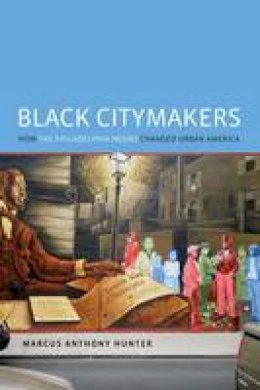Hunter performs the kind of delicate theoretical acrobatics that make this book a significant contribution to the sociological literature on the causes, consequences, and, most important, responses to social inequality. Scholars and students interested in historical, political, and urban sociology as well as race, inequality, and social movements should read this book.
American Journal of Sociology
...
Read moreHunter performs the kind of delicate theoretical acrobatics that make this book a significant contribution to the sociological literature on the causes, consequences, and, most important, responses to social inequality. Scholars and students interested in historical, political, and urban sociology as well as race, inequality, and social movements should read this book.
American Journal of Sociology
This is book well worth reading. Rich in detail, it captures in one city a pattern of urban transformation that was repeated across the nation.
Ethnic and Racial Studies
Using four extended case studies rooted in the same geographical area of Philadelphia, Hunter shows that Philadelphia's cultural, economic, geographic, and political realities of the twentieth and twenty-first century were strongly shaped, for better and for worse, by Black agency. To speak historically without consideration of the very real human agency exhibited by all of the actors in the city, as Hunter argues, is to ignore DuBois's powerful assertion that one of the greatest flaws in sociology has been the treatment of Black people as objects and not subjects of analysis.
Du Bois Review
Hunter organizes the book around several crucial historical moments ... He uses these episodes to illustrate his central argument that Philadelphia's black residents have been agents of change, challenging the dominant image of blacks as victims of urban renewal and as a politically homogenous group. Hunter concludes that the Black Seventh Ward inspired a new generation of black citymakers but ultimately lives on only in the collective memory of black Philadelphians. The reader is left with a more complicated picture of how the Philadelphia DuBois visited in 1896 transformed into the twenty-first-century city characterized by growth and great optimism for some and persistent poverty, violence, and failed institutions for many others.
The Pennsylvania Magazine of History and Biography
Hunter agues that the Black Seventh Ward not only encapsulated influential black political actions, but also reflected the larger political struggles of the city during the last century. This argument is an important advance for scholars who expect residents of black neighborhoods, especially those who are working class, to have had little structural impact on their cities.
City & Community
I recommend this work to students of urban social and economic policy for three primary reasons. First, Hunter uses historical, ethnographic methods to demonstrate the quality of black life as it relates to municipal policy in Philadelphia from 1899 to 2010... Hunter's second notable contribution... is his painstaking demonstration of the way in which blacks have been actors within the policy milieu as their position has evolved from relative weakness to relative strength... Finally, he provides a textured and well-documented rebuttal of the econometric and normative arguments that suggest benevolence and genetic inferiority are the reasons for continued socioeconomic disparities between the black minority and white minority populations.
Social Science Review
Black Citymakers is singular in its documentation of pivotal political and economic events in American history that may be less known to readers... [and] the book succeeds in illustrating how the structure-versus-agency discourse played out in real time in a specific locale. Hunter provides a deftly written, convincing portrait of urban residents actively engaged in spatial transformation as well as some of the intended and unintended consequences. Scholars and students in sociology, political science, geography, social psychology, history, and cultural studies could benefit from Hunter's extensive knowledge of the experiences of the 'Philadelphia Negro' across time.
Urban Affairs Review
Taking W.E.B. DuBois's The Philadelphia Negro as its departure point, Marcus Hunter has written a wonderful book that builds on the insights of DuBois by exploring the political, social, and economic evolution of Philadelphia's Seventh Ward since DuBois's canonical study of the neighborhood. Especially attentive to the agency of black Philadelphians, Hunter demonstrates throughout the book that black residents of Philadelphia were active participants and leaders in the evolution of their neighborhood and their political power. Black Citymakers is a must read for all those concerned with urban and black politics today as well as those who wish to understand the transformation of Philadelphia's Seventh Ward and so many other cities across the country.
Cathy J. Cohen, author of Democracy Remixed: Black Youth and the Future of American Politics
Using the ingenious method of a neighborhood life history, Black Citymakers charts more than a century of Black political agency in Philadelphia. There are no victims here, only savvy, creative, entrepreneurial, and dedicated Black Philadelphians whose proactive decisions have shaped the social geography of the city. This empirically rich, theoretically smart, and narratively elegant book charts a bold new course for the study of race and politics in urban history and sociology.
Mary Pattillo, author of Black on the Block: The Politics of Race and Class in the City
Finalist, 2013 C. Wright Mills Award
Read less
